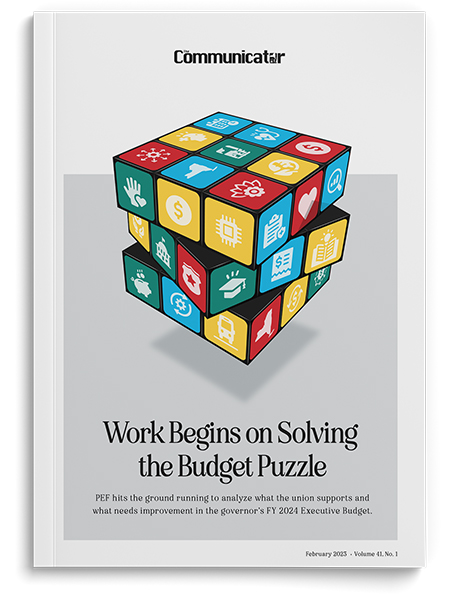 February 17, 2023 — PEF submitted written testimony on Feb. 7 to a committee focused on the public protection components of the governor’s executive budget proposal. The written testimony and the remarks made by in-person witnesses will help the committee as it considers how best to fund state-operated services for incarcerated and formerly incarcerated individuals; including ways to improve staffing and safety, and add hazard pay at the Department of Corrections and Community Supervision (DOCCS).
February 17, 2023 — PEF submitted written testimony on Feb. 7 to a committee focused on the public protection components of the governor’s executive budget proposal. The written testimony and the remarks made by in-person witnesses will help the committee as it considers how best to fund state-operated services for incarcerated and formerly incarcerated individuals; including ways to improve staffing and safety, and add hazard pay at the Department of Corrections and Community Supervision (DOCCS).
State-operated services and hazard pay
PEF feels this year’s budget surplus provides the state a unique opportunity to address public safety concerns around mental health and addiction, reinvest savings to support greater mental health, wellness, education, training, and addiction services to incarcerated individuals, and bolster DOCCS’ ranks amid a staffing decline.
PEF fully supports the effort to reduce the state’s incarcerated population, but the work needs to fall to well-trained and educated state employees and not private providers. The over-reliance on private providers is a detriment to the continuum of care and misses the mark on integrated services for those with multiple needs.
Hazard pay, beyond the provisions of the Healthcare Workforce Bonus program included in last year’s budget, could go a long way toward retaining staff and is a fitting recognition for the hard work and sacrifices made during the pandemic.
PEF is urging legislators to include hazard pay in this budget for all staff who interacted with incarcerated individuals and parolees daily, as well as others deemed “essential” during the pandemic.
Community supervision legislation and amendments
The union fully supports the governor’s intentions with the “Gun Involved Violence Elimination (GIVE) program, the “Supervisors Again Violent Engagement” (SAVE) initiative, and increased funding for re-entry services.
PEF is asking the legislature to pass GIVE and SAVE, as well as enact legislation to develop a real system of integrated state-operated wellness, mental health, addiction, job placement and other programs to help formerly incarcerated individuals access services for success.
“Less is More”
The “Less is More” law, as passed, needs to be amended to better serve parolees, parole officers, and the community. While PEF supports portions of the law, like providing earned time credits for adhering to a parole plan and ensuring parolees have expedited proceedings, the law falls short in other ways.
Since 2021, the number of parolees in New York City has decreased. Over this same period, the number of parolees rearrested for a misdemeanor or felony has increased. PEF believes this to be, in part, due to some parolees no longer feeling compelled to adhere to addiction treatment, mental health plans, or other parole plans because Less is More no longer allows for their reincarceration for failure to follow required plans.
PEF is calling for a higher standard for violent felony offenders; real sanctions for parolees convicted of violent felonies; correcting shortcomings of earned time credits that allow those who do not adhere to parole plans to also receive the credits; and instituting a “red flag” provision for at-risk parolees allowing officers to seek an immediate judicial review and determination for limited reincarceration for violations representing immediate danger to themselves or the community.
“HALT”
In the interest of protecting incarcerated individuals and staff from ongoing assaults by other incarcerated individuals, PEF is asking for changes to the Humane Alternatives to Long-Term Solitary Confinement Act (HALT).
Suggested policy solutions include utilizing the state’s excess correctional facility space to establish separate, segregated space to provide protective options for those targeted; reestablish the use of “step down” programs to allow earned privileges and the use of fewer restraints for good behavior; expand professional mental and behavioral treatment; establish a merit system to shape positive behavior; and continued expansion of re-entry services.
